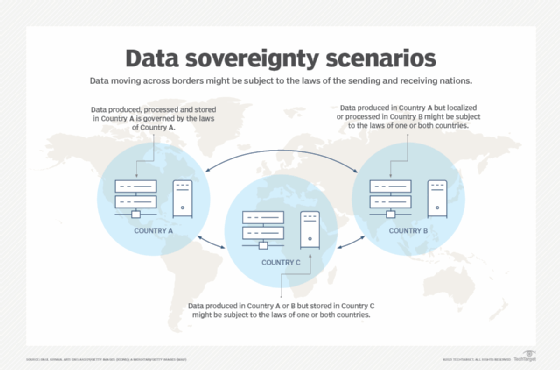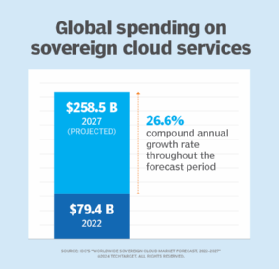
A data sovereignty primer for cloud admins
Data sovereignty is a critical part of any cloud deployment that cloud administrators must understand. Implement these best practices to ensure compliance now and in the future.
Today's consumers value privacy and control of their personal information. Businesses face significant consequences if they fail to secure information in accordance with data sovereignty laws and regulations.
Data sovereignty is the concept that data is subject to the laws and regulations of the country in which it is processed or stored. According to the IAPP, 79% of the world's population resides under some type of data privacy law. Therefore, data sovereignty and data protection are critical facets of today's cloud administration practices.
To properly recognize the scope of the concern, cloud admins must understand the following three key elements of data management:
- Data sovereignty. Data is subject to the laws and regulations of the country or legal jurisdiction where it is stored, processed or transits through.
- Data localization. Requires that data must be stored and processed within a specific country's borders.
- Data residency. The decision to store data in a particular location that's compliant with a chosen set of regulations.
With these three ideas in mind, let's examine the benefits and challenges of implementing an effective and compliant data sovereignty management system in a cloud environment.

The role of data management in regulatory compliance
An effective data management system helps ensure compliance. It can also provide the organization with greater observability into the data it stores, enabling better utilization of that information for business agility.
Consider the types of data an organization works with. It might be personally identifiable information belonging to customers and employees. It could be government-related information or healthcare data. Some information might be proprietary or intellectual property belonging to your company.
Regardless of the kind of information, organizations must integrate data management compliance into all aspects of cloud planning and operations. Failure to adhere to requirements can result in severe consequences, such as the following:
- Damage to reputation.
- Legal action and penalties.
- Financial expenses.
As noted in the "2025 Outlook: Data Integrity Trends and Insights" report, organizations realize significant benefits from a data governance program. In fact, 50% of the respondents indicated increased regulatory compliance with their data governance initiative.
Best practices for implementing data sovereignty in the cloud
Cloud administrators can use the following best practices to implement an effective data sovereignty plan in their organizations:
- Know where the organization stores its data, whether it's in the cloud or on-premises. For multinational organizations, data might reside in different jurisdictions.
- Understand applicable laws based on where the business stores and processes data.
- Understand the path that data in transit might take between storage and processing centers. Edge computing, IoT and content delivery networks each have their own considerations.
- Vet and choose cloud service providers (CSPs) carefully. Pay special attention to compliance statements and certifications.
- Review CSP compliance certifications regularly.
- Implement a comprehensive security and access control system to manage who can access resources or make changes to storage and compute configurations.
- Conduct regular audits and compliance checks.
- Monitor regulatory changes to identify changes the organization must address.
- Implement a data classification mechanism and a data governance process to identify information that might be subject to data sovereignty requirements.
- Ensure that disaster recovery plans and alternate sites adhere to data sovereignty requirements.
- Plan for data portability to avoid vendor lock-in or the need to change CSPs due to a lack of compliance.
What about sovereign clouds?
A sovereign cloud is one of the most effective tools for ensuring compliant data. Deployment begins with the idea that data is subject to a country's laws (i.e., data sovereignty). Therefore, the sovereign cloud infrastructure must reside entirely inside the specified country. All aspects of the cloud's operations occur within a nation's borders, ensuring compliance with regulations. Specifically, data processing and storage occur within the sovereign cloud, which itself is entirely within the country's borders.

How do sovereign clouds work?
One of the original benefits of cloud computing was that users and organizations didn't care where storage and processing occurred. CSPs could implement data centers anywhere in the world, and the primary physical concern was providing consumers with quick access to data. However, with the growth of data sovereignty regulations, organizations must now carefully manage the physical location of data.
Sovereign clouds enable close management of data by placing all cloud compute and storage resources within a single boundary and preventing the exposure of information outside the area. This facilitates the following:
- Compliance with a known and predictable set of laws and regulations.
- Restricted data access.
- The organization retains complete control of data within a set boundary.
Data residency and sovereign clouds
Sovereign clouds help clarify and enforce data management practices by restricting data to specific locations and governing it under particular laws.
It's essential to differentiate data residency and data sovereignty.
- Data residency. Defines the geographical location where data is stored, which may be related to specific requirements. This is a logistical or technical aspect of data control.
- Data sovereignty. Defines which laws and regulations apply to that data from a data management perspective. It governs who can access or regulate the data. It also applies to who can compel data disclosure.
Expect sovereign clouds -- and private clouds -- to continue to grow to meet privacy requirements. Data sovereignty is not a challenge that will soon go away.
Damon Garn owns Cogspinner Coaction and provides freelance IT writing and editing services. He has written multiple CompTIA study guides, including the Linux+, Cloud Essentials+ and Server+ guides, and contributes extensively to Informa TechTarget, The New Stack and CompTIA Blogs.






